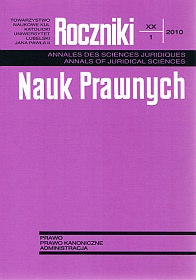Niepozytywistyczna koncepcja prawa
Abstrakt
The author of this article formulates a non-positivist conception of law, similar to the ones developed by R. Dworkin and R. Alexy, yet not identical with them. At present there are numerous non-positivist theories of law which do not employ a strong proposition regarding the natural law. Supporters of legal non-positivism include common moral principles in the area of law and assume that these principles are both causes of human actions and propositions that justify such actions.
The author draws on R. Alexy in giving arguments for and against legal positivism, and he regards the relativity argument as the basis. Indeed, a positivist can accuse a non-positivist of making law conditional upon moral judgment, which may not be rationally defended. This article as a whole may be treated as a response to this argument.
The non-positivist theory of law, defended in this article, assumes that both moral principles and legal norms have a prima facie character. Speaking of prima facie norms (inter alia, principles) and values, the author implies that they are justifiable, but neither certain nor acceptable in the present mode of justifying. Further, they are possible to be weighed. Finally, they are possible to be revoked, at least in the minimum sense of being not perpetual. It is the author’s view that all morality has a prima facie character, i.e. it is possible to be revoked and weighed. Generally, each legal norm can be presented as a result of the legislator weighing arguments. Weighing of arguments leads to problems with coherence.
The recognition of values, principles and weighing does not entail disregard for norms. The author believes that one has a prima facie moral duty to obey law. However, the legal application of a normative system as a whole is not independent of its content. The author assumes that an extremely immoral normative system will have no application.
Copyright (c) 2010 Roczniki Nauk Prawnych

Utwór dostępny jest na licencji Creative Commons Uznanie autorstwa – Użycie niekomercyjne – Bez utworów zależnych 4.0 Międzynarodowe.


